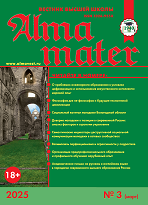Stanislav B. Bondarenko, Dr. Sc. (Philosophy), Professor, Pyatigorsk Branch of the Russian State Social University, e-mail: bondsb@rambler.ru
In the 21st century, a grandiose discussion continues about the nature of science, the patterns of scientific development, the scientific nature of ancient thinking, and the historical significance of ancient knowledge. The purpose of the article is to outline the main ways of explaining for the specifics of ancient science. The characteristic for the ways of explanation presents a difficult problem. The explanation of the specifics of ancient science reveals the reasons on the basis of which the existence and development of ancient science is recognized. The author has strived for maximum objectivity and accuracy in presenting the main ways of explanation. The problem of ways to explain the specifics of ancient science has not received proper analysis in Russian and foreign literature. This problem has been considered sporadically in the context of general studies of economics, culture, history, science, and technology. The researchers proceed from the concepts and methods of various philosophical schools (marxists, positivists, kantians, romantics, pragmatists, spenglerians, freudians, etc.). The article presents the main ways of explaining the origin and specificity of ancient science: sociological, methodological, cultural, anthropological. The author substantiates the generalizing axiological way of explaining and understanding for the specificity of ancient science. The ongoing discussions about the nature of ancient science and its significance confirm the actuality of the topic of the article.
Keywords: antiquity, philosophy, science, explanation, causes, values, culture, polis
References
1. Comte, A. Course of Positive Philosophy. V. 1. St. Petersburg: Mediator, 1900. 302 p.
2. Comte, A. The Spirit of Positive Philosophy. Rostov-n/Don: Phoenix, 2003. 256 p.
3. Comte, A. Course of positive philosophy. V. 2. St. Petersburg: Mediator, 1901. 167 p.
4. Russell, B. History of Western Philosophy. Moscow: Academic Project, 2004. 1004 p.
5. Marx, K. Capital. V. 1 / Marx, K., Engels, F. Works. 2nd ed. V. 23. Moscow: IPL, 1960. 900 p.
6. Engels, F. Anti-Dühring / Marx, K., Engels, F. Works. 2nd ed. V. 20. Moscow: IPL, 1961. P. 1–338.
7. Engels, F. Dialectics of Nature / Marx, K., Engels, F. Works. 2nd ed. V. 20. Moscow: IPL, 1961. P. 339–626.
8. Kudryavtsev, P.S., Confederatov, I.Ya. History of physics and technology. Izd. 2nd. Moscow: Prosveshchenie, 1965. 571 p.
9. Losev, A.F. Types of ancient thinking / Losev, A.F. Philosophy. Mythology. Culture. Moscow: Politizdat, 1991. P. 453–473.
10. Rozhansky, I.D. Antique Science. Moscow: Nauka. 1980. 199 p.
11. Vernant, J-P. The Origin of Ancient Greek Thought. Moscow: Progress, 1988. 324 p.
12. Graffi, S. La Rivoluzione Dimenticata (The Forgotten Revolution). Notices of the American Mathematical Society. 1998. Vol. 45. No. 5. P. 601–605.
13. Russo, L. The Forgotten Revolution: how science was born in 300 BC and why it had to be reborn. Berlin: Springer, 2004. 487 p.
14. Gomperz, T. Greek thinkers. V. 1. St. Petersburg: Aleteia, 1999. 605 p.
15. Gomperz, T. Greek thinkers. V. 2 St. Petersburg: Aleteia, 1999. 257 p.
16. Lurie, S.Ya. Archimedes. Moscow–Leningrad: Izd-voor AS USSR, 1945. 270 p.
17. Sagan, C. Cosmos: Evolution of the Universe, Life and Civilization. St. Petersburg: AMPHORA, 2006. 525 p.
18. Sarton, G. History of Ancient Science. Moscow: Centerpoligraf, 2022. 751 p.
19. Tannery, P. The First Steps of Ancient Greek Science. St. Petersburg: Izd. V. Bezobrazov, 1902. 449 p.
20. Figuier L. Luminaries of Science: in 3 vol. Т. 1: Great scientists of antiquity. M.-SPb.: Izd. Wolf, 1869. 427 с.
21. Clagett, M. Greek Science in Antiquity. New York: Collier Books, 1955. 217 p.
22. Farrington, B. Science in Antiquity. London: Oxford University Press, 1947. 256 p.
23. Lindberg, D.C. The Beginnings of Western Science. Chicago: University of Chicago Press, 1992. 455 p.
24. Bonnard, A. Greek Civilization. Moscow: Art, 1995. 671 p.
25. Spengler, O. The Decline of Europe. Essays on the Morphology of World History. V. 2. Moscow: Mysl, 1998. 606 p.
26. Spengler, O. The Decline of Europe. Essays on the Morphology of World History. V. 1. Moscow: Mysl, 1993. 663 p.
27. Jung, C.G. The Phenomenon of Spirit in Art and Science. Moscow: Renaissance, 1992. 320 p.
28. Gaidenko, P.P. Evolution of the concept of science. Moscow: Nauka, 1980. 567 p.
29. Diogenes of Laertius. On the Life, Teachings and Sayings of Famous Philosophers. Moscow: Mysl, 1979. 620 p.
30. Bondarenko, S.B. Global scientific and technological revolution. Moscow: Znanie-M, 2023. 193 p.
31. Bachelard, G. New Rationalism. Moscow: Progress, 1987. 376 p.
32. Jua, M. History of Chemistry. Moscow: Mir. 1975. 477 p.











.png)






